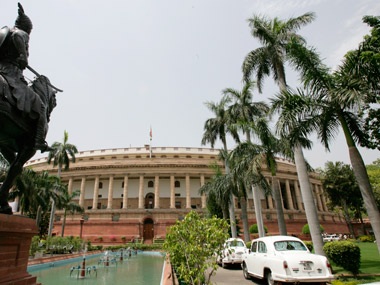New Delhi: Amid demands that MPs should not be allowed to decide their salaries, the government has proposed to set up a three-member panel to recommend pay and perks of lawmakers. The Ministry of Parliamentary Affairs has proposed a 3-member independent Emoluments Commission to recommend salaries and other allowances for the Members of Parliament. The proposal is part of the agenda notes prepared for the two-day All India Whips’ Conference to be held at Visakhapatnam, next week. [caption id=“attachment_2446742” align=“alignleft” width=“380”]  Image courtesy: Reuters[/caption] “The setting up of an independent Emoluments Commission for recommending the salaries and allowances of the Members of Parliament will not only put to rest the public outcry and media criticism over MPs themselves deciding their salaries, it will also provide an appropriate opportunity to take into consideration the huge responsibilities and the important role they play in our representative democracy. “It would ensure that recommendations on Parliamentary salary are reached in a fair, transparent and equitable way. Once there is consensus on setting up of the commission, the Salary, Allowances and Pension of Members of Parliament Act,1954 will be suitably amended,” it said. The last revision in salary of MPs was made in 2010 during UPA II rule and the lawmakers at present get a basic salary of Rs 50,000 per month. As per a comparative analysis of Members of Parliament in 37 developing and developed countries, basic salary of MPs are in the range of a meagre Rs 7,952 in Tunisia to a high of Rs 6,16,675 per month in Israel. MPs of only in six countries –Tunisia, Venezuela, Sri Lanka, Nepal, Haiti and Panama are drawing salary less than that of Indian MPs. According to a survey conducted by Inter-Parliamentary Union (IPU) of 138 chambers from 104 Parliaments, 69 chambers indicated that it is Parliament which determines the salaries of members. 31 of these stated that MPs’ salaries are determined in reference to the Civil Service salary scale. In case of Bhutan, Namibia and the UK House of Commons, salaries are determined by independent bodies. An MP in India gets a salary of Rs 50,000 per month. In addition, Rs 2,000 per day is paid as daily allowance when the MP signs the register while attending Parliament sessions or House committee meetings. The MP is entitled to Rs 45,000 constituency allowance every month – Rs 15,000 for stationery and Rs 30,000 to employ secretarial assistance staff. MPs are also entitled for a government accommodation, air travel and train travel facilities, besides three landline and two mobile phones. They also get a loan of Rs 4 lakh to buy a vehicle. PTI
Amid demands that MPs should not be allowed to decide their salaries, the government has proposed to set up a three-member panel to recommend pay and perks of lawmakers.
Advertisement
End of Article
Written by FP Archives
see more


)

)
)
)
)
)
)
)
)



